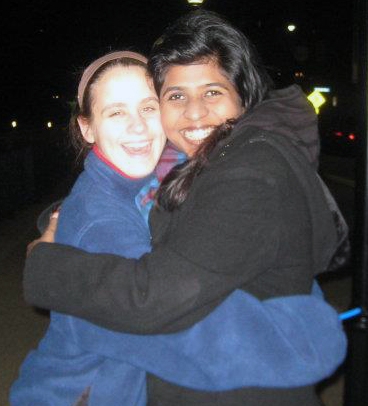
Pakistanis have high standards when it comes to hospitality, but those standards were met by American families who hosted participants in ICFJ’s U.S.-Pakistan Professional Partnership in Journalism.
“It felt like home,” Ahsan Raza, a print journalist from Lahore who worked at a newsroom in Fort Myers, Fla., says of his stay at the home of a newsroom colleague during his fellowship. “My host would not only drive me to and from work every day and to field assignments, she would also take me to the beach, introduce me to her friends, show me the best bars, etc.”
However, the gesture that truly impressed Raza was the effort that his hosts made to ensure his comfort in their home. “Before I had even arrived in Fort Myers, the family started talking to me via email to ask about my dietary preferences, allergies, and any other accommodation needs. If you want to see the true face of Americans and American society and experience their amazing hospitality, homestays are your best bet.”
Homestays enable participants from ICFJ’s State Department-funded exchange program for Pakistani and American journalists to stay in the homes of a staff member of the newsroom where they work during their three-week fellowship. Although only a small number of fellows have been able to take advantage of this opportunity, it has consistently been ranked as one of the most valuable components of their fellowship.
“For someone like me who is very observant and curious about other cultures, it was the best way to learn about American culture up close,” says Mariyam Ali, a broadcast journalist from Lahore who was placed in Hartford, Conn. She said this experience dispelled her preconceived notions about Americans, which were derived from Hollywood films and American TV shows.
One of the misconceptions that Mariyam had harbored about the American family before she came to Connecticut for her fellowship was one that is quite common among Pakistanis. “Unlike the [Pakistani] perception that American families have a weak family structure, I found American parents just as caring and responsible as any Pakistani parents,” she explains. “In fact, I really admire the way American parents try to raise their children because they do everything – from picking them up from school to cooking meals after work – without any domestic help. We, in Pakistan, can’t even think of taking on so much responsibility.”
For Desiree Natasha Francis, a radio journalist from Karachi who spent her fellowship in Pittsburgh, it wasn’t just about learning and observing American culture but also an opportunity to share with her hosts aspects of Pakistani culture.
“I was ecstatic knowing that I will be able to share stories about Pakistan, directly or indirectly to a group of people, adults and children included,” says Desiree. “You may be who you are, but when you are on a program like this, you are representing your country, and everything you do, however big or small, is noticed and makes a difference.”
Some of the fellows even had the opportunity to introduce their hosts to Pakistani food. “I cooked Chicken Karhai for my hosts, which they really enjoyed,” recalls Zaib-un-Nisa, a print journalist from Islamabad who lived in Philadelphia, Pennsylvania.